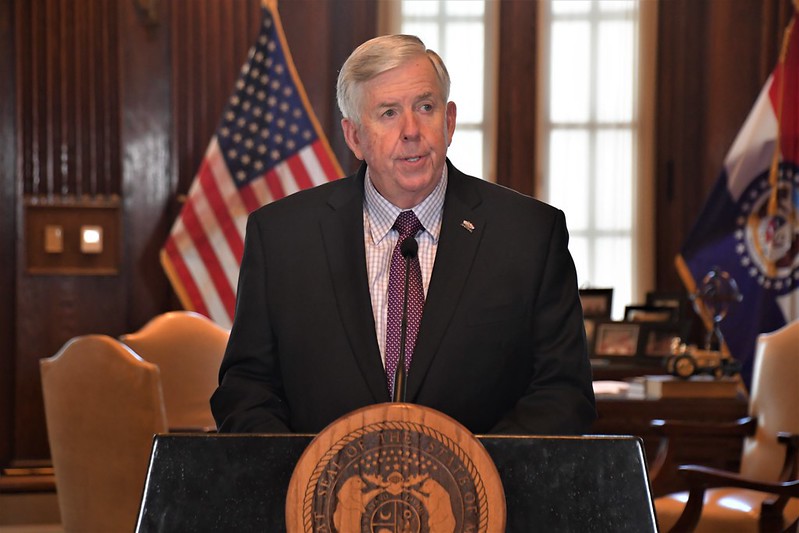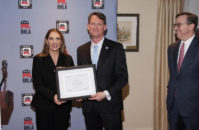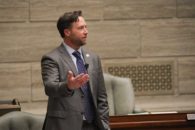JEFFERSON CITY, Mo. — Less than three weeks after Gov. Mike Parson asked the Missouri Legislature to consider COVID-19 liability protections during the ongoing extraordinary session, the Republican chief executive reversed course.
Parson has asked Senate leadership to remove the COVID liability protection bill, authored by Sen. Ed Emery, from the special session called to appropriate federal coronavirus relief funds. The bill was still being heard in Emery’s Government Reform Committee when the request was made public.
The expectation is for lawmakers to take up the issue during the regular session when it commences in January.
“It remains a top priority to protect Missouri small businesses and deliver certainty in these uncertain times,” Senate Majority Leader Caleb Rowden told The Missouri Times. “We’ll continue working to find an effective solution as quickly as possible.”
“Hundreds of millions of dollars in COVID-19 relief has been sitting in state coffers for far too long,” Senate Minority Leader John Rizzo told The Missouri Times. “The legislature needs to be laser-focused on getting these dollars out to families, schools, and businesses suffering from this pandemic. Keeping the special session limited to this singular purpose makes sense.”
Senate President Pro Tem Dave Schatz did not immediately respond to a request for comment.
Tuesday afternoon’s hearing included testimony from Mark Moreland of the Missouri Association of Trial Attorneys, who spoke against the measure before the committee.
“This bill makes it impossible for an injured person to recover if a product is defective,” he said. “I have not heard of a single lawsuit in the state of Missouri, even though we’ve had multiple outbreaks in nursing homes.”
The committee ultimately met for more than two hours without voting on it. Emery thanked the witnesses and legislators for persevering through the meeting.
“I do think this has been valuable in informing members and working towards the perfection of the legislation, regardless of when it is actually pursued,” Emery said.
Parson asked lawmakers to expand the extraordinary session to include COVID liability protections in mid-November. The bill had three protection components: health care workers providing necessary care during the ongoing state of emergency; manufacturers producing, designing, and selling goods directly related to the pandemic; and premises such as schools, churches, businesses, and nonprofits. The goal was to protect these entities from being held accountable for transmission or exposure claims on their premises or through their operations during the pandemic.
When he called for the expansion, Parson said he hoped for the provision to be finished before the Thanksgiving holiday. However, the Senate postponed its proceedings until this week after at least one member and one staffer tested positive for COVID-19.
“Since the start of COVID-19, our health care providers have gone above and beyond to respond to COVID-19 and provide exceptional care in an unprecedented and rapidly changing environment,” Parson said. “Many other organizations across the state have also been instrumental in our response efforts, including manufacturers, businesses, churches, and schools, just to name a few.”
“None of these groups should be penalized for their efforts to respond to a declared state of emergency,” he said. “They must be able to continue operating and serving the public without risk of unnecessary and frivolous claims.”
Incoming House Speaker Rob Vescovo had implored the governor to expand the session to include COVID liability.
“The cost of this pandemic has been dire not only in the lives that have been lost but also with the massive disruption we have seen for Missourians and Missouri businesses in all parts of the state,” Vescovo said. “If we are to give our state the best chance to recover from this ongoing pandemic, it’s imperative that we take on these issues sooner rather than later.”
Earlier Tuesday, the Senate Appropriations Committee met to consider the supplemental budget package in a hearing that stretched for nearly two hours. While the bill ultimately passed out of the committee in a unanimous vote (with one senator absent), it was met in committee with some frustration by senators over transparency and appropriation issues.
Cameron Gerber contributed to this report.

Kaitlyn Schallhorn was the editor in chief of The Missouri Times from 2020-2022. She joined the newspaper in early 2019 after working as a reporter for Fox News in New York City.
Throughout her career, Kaitlyn has covered political campaigns across the U.S., including the 2016 presidential election, and humanitarian aid efforts in Africa and the Middle East.
She is a native of Missouri who studied journalism at Winthrop University in South Carolina. She is also an alumna of the National Journalism Center in Washington, D.C.
Contact Kaitlyn at kaitlyn@themissouritimes.com.


































